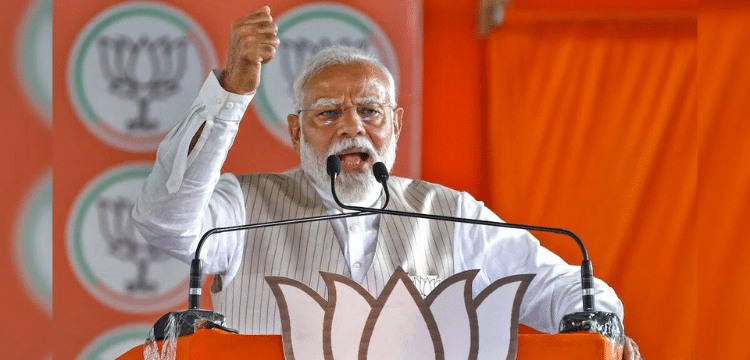Indian Prime Minister Narendra Modi’s alliance surged towards a majority in early vote counts of the general election on Tuesday, though the figures fell short of the landslide exit polls had predicted, according to TV channels.
The initial volatile trends unsettled markets, causing steep stock declines. The blue-chip NIFTY 50 dropped 4.4%, and the S&P BSE Sensex fell 4.2% by 0600 GMT. The rupee also plummeted against the dollar, and benchmark bond yields rose.
Markets had previously soared on Monday after June 1 exit polls forecasted a significant victory for Modi and his Hindu nationalist Bharatiya Janata Party (BJP), with the National Democratic Alliance (NDA) expected to secure a two-thirds majority.
Read more: Indian Electorate Dismisses Modi’s Divisive Rhetoric In Elections
By 0600 GMT, TV channels indicated the NDA was leading in nearly 300 of the 543 parliamentary seats, surpassing the 272 needed for a simple majority. The opposition INDIA alliance, led by Rahul Gandhi’s Congress party, was ahead in over 220 seats, exceeding expectations. The BJP alone led in nearly 250 seats, short of an independent majority compared to its 2019 victory of 303 seats.
A potential third Modi term with a slim BJP majority or reliance on NDA allies might introduce governance uncertainty, given Modi’s strong control in the past decade.
Politicians and analysts cautioned that the trends were preliminary as many ballots remained uncounted. BJP spokesperson Nalin Kohli noted that while some projections of 400 seats for the NDA seemed distant, the overall trend pointed towards a BJP-NDA government.
Exit polls, which projected a substantial win for Modi, have historically been unreliable in India. Despite the contentious campaign, a confirmed Modi victory would underscore the BJP’s resilience.
Market panic ensues
Investors had welcomed the possibility of another Modi term, expecting continued strong economic growth and pro-business reforms, with the anticipated two-thirds majority in parliament enabling significant constitutional changes.
“The sharp drop in Nifty is because the early trends present a picture very different from the exit polls,” said Siddhartha Khemka, head of retail research at Motilal Oswal Financial Services in Mumbai. “This has led to some panic and concern. These are early trends, and the market fears a hung parliament or a coalition government, which would cause delays in decision-making,” he added.
The seven-phase election, held over seven weeks starting April 19, took place in extreme summer heat, with temperatures nearing 50°C (122°F) in some regions. Despite this, more than 66% of registered voters participated, just one percentage point lower than the 2019 election, dispelling pre-poll fears of low turnout in an election presumed to favor Modi.
Modi, 73, who first came to power in 2014 on promises of growth and change, seeks to become the second prime minister after Jawaharlal Nehru to win three consecutive terms. He highlighted his record on economic growth, welfare policies, national pride, Hindu nationalism, and personal commitment, dubbing it “Modi’s Guarantee.”
However, after low turnout in the first phase, Modi shifted his strategy, accusing the opposition, particularly Congress, of favoring India’s 200 million Muslims. Analysts suggest this move aimed to energize his Hindu nationalist base. Modi refuted claims of stoking religious divisions, asserting he was merely criticizing the opposition.
The opposition INDIA alliance denied favoritism towards Muslims, warning that Modi’s return could threaten the constitution and end affirmative action for backward castes, a claim the BJP rejects.











